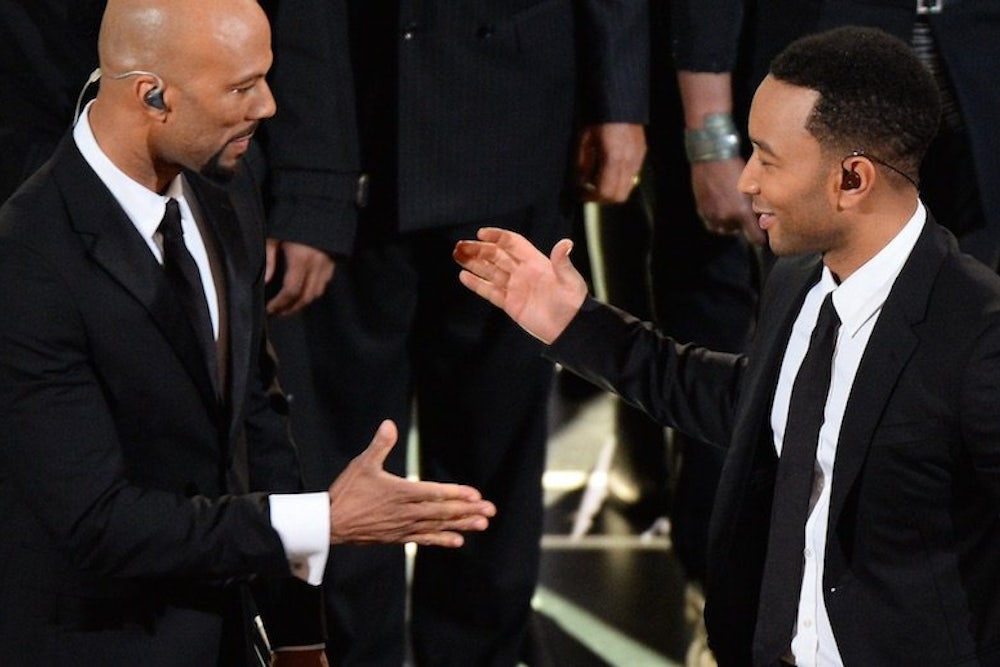The road to the 87th Academy Awards has been more fraught than usual, with tension over the least racially diverse awards in 17 years and the lack of recognition for historical drama Selma. It wasn’t just a bunch of golden statuettes from the world’s most glamorous party at stake, but some part of the country's soul. Going into the ceremony Sunday night, the overwhelming sense was that Hollywood, for all its famous liberalism, was actually populated by hypocritical old, white men out of touch with reality.
Perhaps because of the uncomfortable run-up, these "Whitest Oscars Ever," hosted by Neil Patrick Harris, turned out to be a surprisingly political ceremony, the most candid and activist Hollywood has been in years. Not only did many of the winners use their stage time to stump for causes, but the usually conservative telecast let them. The Oscars are known for cutting away from winners broaching sensitive subjects or for swelling the music when someone gets carried away (think Michael Moore berating George W. Bush). This year, they were happy to let people get it all out—even if it led to the ceremony running well over time.
Patricia Arquette, who took home the Best Supporting Actress statuette for her performance as the weary mother in Boyhood, kicked off the political activism with a plea for gender equality that had Meryl Streep, Jennifer Lopez, and others jumping from their seats. “To every woman who gave birth, to every taxpayer and citizen of this nation, we have fought for everybody else’s equal rights,” she said. “It’s our time to have wage equality once and for all and equal rights for women in the United States of America!”
Some of the politics was expected, such as Laura Poitras’ warning against the surveillance state after winning the Oscar for her documentary about Edward Snowden, Citizenfour. But it was Best Original Song, of all categories, that made the most powerful political statement of the night. Selma, without deserved nods for acting, cinematography, and directing, got its moment in the sun with Common and John Legend’s performance of “Glory.” The Oscars telecast may have earned itself an Emmy nomination by building the Edmund Pettus Bridge on stage, set against a cloudy sky that gave way to stills from Selma. As Common rapped about Rosa Parks and Ferguson, Jim Crow and Martin Luther King, protesters marched peacefully as a unit—and without opposition—across the bridge onto the stage. The performance earned a standing ovation and left much of the audience, including David Oyelowo, who played Dr. King, in tears.
When “Glory” then won, the two singers seized the moment. They knew all too well that it was the only one Selma was going to get. They didn’t thank anyone except God, and used their time for this instead:
“Selma is now,” Legend said. “The struggle for justice is now. The Voting Rights Act that they fought for 50 years ago is being compromised right now in this country today. Right now the struggle for justice is real. We live in the most incarcerated country in the world. There are more black men under correctional control today than were under slavery in 1850. When people march with our song, we want to tell you: we see you, we are with you, we love you, and march on.”
After "Glory,” almost every winner rode the moment as an opportunity to take a stand. Graham Moore, who wrote The Imitation Game, made up for his undeserved win with a touching speech about his own suicide attempt as a teenager. "I would like for this moment to be for that kid out there who feels like she doesn’t fit in anywhere," he said. "You do.” The triumphant lead actors, Eddie Redmayne and Julianne Moore, both paid tribute to those who suffer the diseases they represented in their on-screen portrayals: ALS and Alzheimer’s, respectively. And in the most bizarre moment of the night, presenter Sean Penn made a strange crack about Birdman director Alejandro Iñárritu’s immigration status, before the Mexican filmmaker to send out an impassioned plea for his country’s democracy as well as the treatment of Mexican immigrants in America.
It’s hard to reconcile this ceremony, with all its passionate speeches for social justice, with the exclusive old boys’ club that is the Academy, the one that somehow thought American Sniper was a more deserving movie than Selma a decade after it preferred Crash to Brokeback Mountain. While Academy president Cheryl Boone Isaacs, the first black woman in the role, has sworn to diversify the institution, it remains 93 percent white and 76 percent male, with an average age of 63.
If anything, the Oscars telecast shows how different the actual people who go to the ceremony, the ones making the speeches and giving standing ovations, are from the thousands of other members who vote. The question then becomes: Which matters more? The Academy is old, insular, and white, but the telecast that it produced this year was the opposite, populated with diverse faces standing up for justice and understanding. That’s not to excuse the Academy’s problems, but it’s the Oscar ceremony, not the ballots of 6,000-some old men, that millions of Americans actually see. Those are the messages they’ll hear, amplified by the glamour and fame of celebrity. In his acceptance speech, Imitation Game screenwriter Moore acknowledged the power of celebrity to effect change: “Stay weird. Stay different, and then when it's your turn and you are standing on this stage please pass the same message along.” On Sunday night, that’s exactly what Hollywood did.
